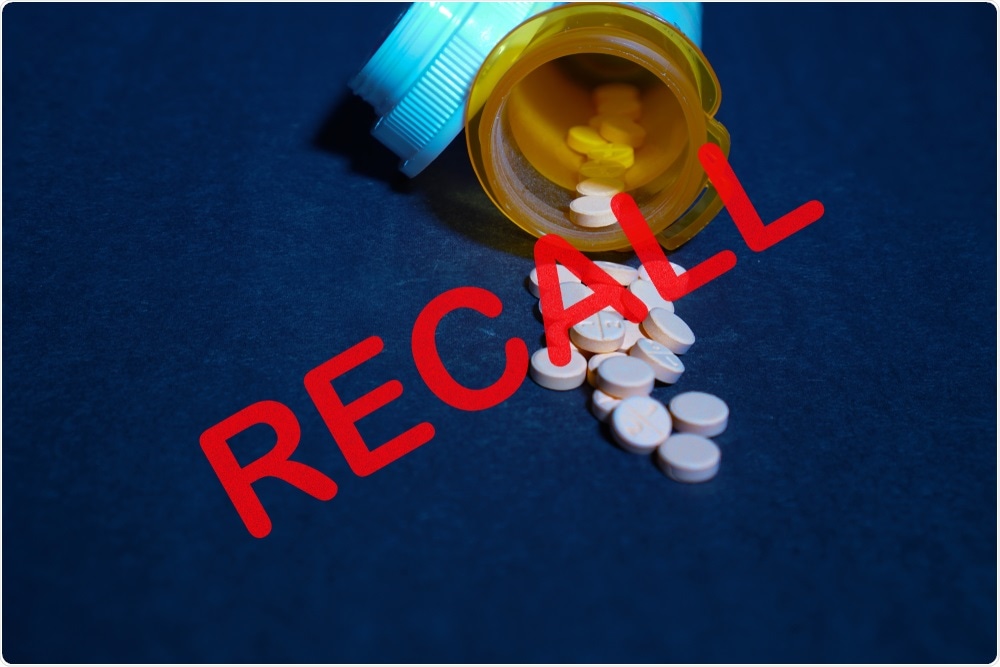Metformin, a prescription drug for people with type II diabetes, helps maintain blood glucose levels. Apotex Inc., a Canadian pharmaceutical corporation, is voluntarily recalling some batches of its metformin drug, sold under the brand name APO-Metformin ER (extended-release).
The pharmaceutical company issued the recall upon discovering that the said batches of the drug had elevated levels of a contaminant linked to cancer.

Image Credit: ThomasMaroulis / Shutterstock
Containing impurities
The recall came after the U.S. Food and Drug Administration (FDA) has recommended recalling the drug because testing revealed excessive levels of N-nitrosodimethylamine (NDMA).
N-nitrosodimethylamine is a volatile, combustible, oily liquid form of nitrosamine that decomposes when exposed to light. It emits toxic fumes of nitrogen when heated. In laboratory settings, the chemical is used to induce tumors in experimental animals and is considered a human carcinogen, a substance that could cause cancer.
When the FDA issued the warning to Apotex, the company immediately agreed to recall the Metformin Hydrochloride Extended-Release 500 mg tablets. Aside from the batch tested, the company extended its recall to all lots of Metformin HCL – E.R. tablets in the United States. Apotex has stopped selling the product in the U.S. in February 2019, but some products remained in the market.
“To date, Apotex has not received any reports of adverse events related to the use of the product,” the U.S. FDA said in a statement.
Currently, the FDA has notified five pharmaceutical companies that they have detected NDMA in their metformin preparations. The regulatory agency has recommended all five firms to recall the NDMA-containing metformin formulations voluntarily.
“The FDA has strict standards for safety, effectiveness, and quality, and the agency makes every effort based on science and data to help keep the U.S. drug supply safe,” Patrizia Cavazzoni, acting director of the FDA’s Center for Drug Evaluation and Research, said.
“As we have been doing since this impurity was first identified, we will communicate as new scientific information becomes available and will take further action, if appropriate,” she added.
Health Canada has shared a list of the affected lots, which contains the impurity that has increased over time to a level of above the acceptable limit.
In February, Ranbaxy Pharmaceuticals in Canada also recalled six lots of its prescription RAN-Metformin drug for NDMA. Also, in March, JAMP Pharma Corporation has recalled 26 lots of its Metformin drug due to NDMA.
Apotex, Inc. has recalled the nine lots, including PK3968, PK3969, PX5336, PY7174, PY7175, RF6463, RF6464, RF6465, and RF6466.
What patients can do
The patients who received the affected lots or those who have questions regarding the recall may contact their local pharmacy on how to return the items. They should not stop drinking their medicine; hence, they should visit their health care provider for medical advice.
FDA said that the risks from not having proper diabetes treatment outweigh any potential effects of exposure to the levels of nitrosamines found in the recalled products.
Many people are exposed to low levels of nitrosamines from food, vegetables, drinking water, and air pollution. FDA said a person taking a medicine containing NDMA at or below the acceptable range every day for 70 years is not expected to have a heightened cancer risk.
“The affected Metformin Hydrochloride Extended-Release Tablets were distributed nationwide in the USA to Warehousing Chains. Apotex Corp. is in a process of notifying its affected direct account Wholesaler, Distributor, Chain Distribution and Warehousing Chains via mail (FedEx Standard Overnight) by mailing a recall notification letter and is arranging for return of all recalled product,” the FDA said.
Metformin and diabetes
Type 2 diabetes affects how the body metabolizes glucose. It reduces the ability of the pancreas to produce enough insulin. Insulin acts as the gateway of glucose into cells, which is turned into energy. When the cells resist insulin, the glucose circulates in the blood, leading to hyperglycemia or excessive glucose levels in the body.
Metformin is an oral medicine for diabetes. It helps control glucose levels in the blood, and it can be used in conjunction with other drugs, such as insulin. Metformin works by decreasing hepatic glucose production, decreasing intestinal absorption of glucose, and enhancing insulin sensitivity in cells.